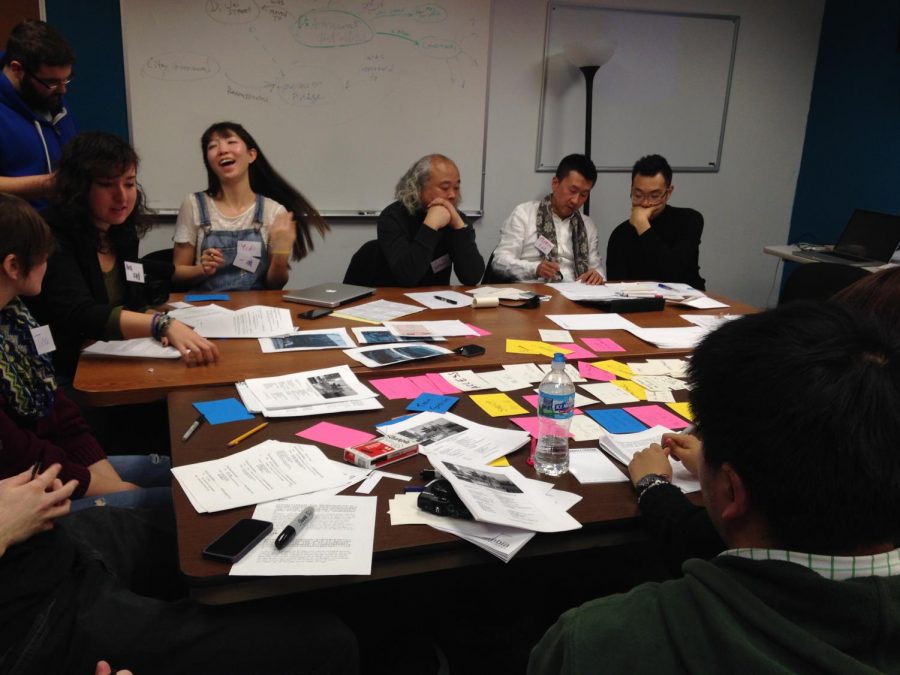Global Digital City Phase II to begin in January
December 8, 2014
Cinema art + science students are partnering with the Beijing Film Academy during J-Term and spring break to create a documentary through the Global Digital City Interactive Documentary Project Phase II which builds on a project started in last year’s Phase I.
Insook Choi, associate provost of creative technology strategy in the Office of Academic Affairs, said although the Beijing Film Academy is small, it is a very powerful institute that has international networks, including some in China. China’s popular film market can help students establish their personal networks, Choi said.
“Our creative practice is very compatible,” Choi said. “They are known to be a hard nut to crack, so it is very fortunate for us to establish this relationship. It’s very exciting, and we have to treasure this relationship. We should keep cultivating [it] in a way that is mutually beneficial.”
Choi said learning should be student-owned and organic. She said the goal of the Global Digital City program is to provide students with a narrative infrastructure to enable a globally collaborative network.
“[It is] a network that is both metaphorical and practical made up of people, media assets, archival materials, computing agents and the cloud, so you can share across oceans and across the board,” Choi said.
Last year’s program allowed students and instructors to meet each other and build a relationship, but this year’s Global Digital City will focus on producing materials based on a shared concept or idea. Ideas and concepts are the foundation of communication, so Global Digital City will be anchored in that capacity, and students will work together using shared ideas rather than shared words, Choi said. Students will also have the opportunity to travel to Beijing over spring break, unlike last years phase I program.
“One of the challenges in international collaboration and global production is how to facilitate people to talk to each other even though they speak different languages,” Choi said. “This year, we are going to introduce a specific narrative technique. This technique isn’t the most cutting edge, but it is extremely accessible because of its universal nature.”
Eve Studnicka, a sophomore cinema art + science major, took part in the program last year and said it was a worthwhile experience for her, even though she was not sure what the program was about at first
“It was just sort of an opportunity to see the city through new eyes [and] through the perspective of these people coming from the Beijing Film Academy who had never been to Chicago before,” Studnicka said. “We spent a lot of time exploring the city and documenting things we saw that we found interesting, and it was an opportunity for me to see the city in a broader, more interesting way.”
She said the program felt like an experiment last year because it was still in its first year. However, she said the experience has kept her interested and invested in the city because she was able to view Chicago with a new sense of curiosity.
“One of the things about Columbia that’s really wonderful is the implementation of diversity and how we’re able to experience a broadening of our own perceptions of the world through having communication with diverse groups of people,” Studnicka said. “In terms of a documentary, the whole idea is to see the world as detailed stories and be curious about things and question your surroundings and question what makes a good story. To combine both of those things is kind of a powerful experience in terms of learning and enjoyment.”
Roderick Plummer, lead professor for the program and a lecturer in the Cinema Art + Science Department, said Bruce Sheridan, chair of the department, asked him to join the program, along with two other professors, because it was the best place to utilize his skills after Plummer returned to Columbia in September after teaching in Southeast Asia for four years.
“Columbia is a very special institution,” Plummer said. “It is, by design and also by spirit, a very collaborative school. The departments are collaborative, the disciplines are collaborative and students come expecting broad exposure. When you add that to this international collaborative effort, especially when that’s to Beijing, which is very current, it’s an extremely exciting and unique opportunity.”
He said the program is a pilot project to focus on the unique talents of the students and how they can use them to communicate with people with whom they do not share a language.
“The world is getting smaller, but it’s not necessarily getting any friendlier,” Plummer said. “If we can put together a pilot project that moves technology forward, we can be the first with the most, and that’s something that we all can be proud of.”








